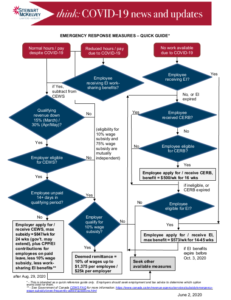Taking stock: Quick reference guide for government initiatives
*Flowchart below last updated June 2, 2020 (Originally published April 14, 2020)
With the passing of Bill C-14, the COVID-19 Emergency Response Act, No. 2 on April 11, 2020, the federal government has now laid a legislative foundation for various initiatives to assist employers and employees who are affected by COVID-19. The main measures include:
- The new Canada Emergency Response Benefit (“CERB”)
- The new Canada Emergency Wage Subsidy (“CEWS”), a 75% wage subsidy for eligible employers for the 12-week period beginning March 15, 2020
- The new 10% Temporary Wage Subsidy for employers
- Enhanced access to Employment Insurance (“EI”) benefits, including streamlining applications to the EI work-sharing program
Details on emergency response measures have shifted over the past few weeks, as they have evolved in response to our ever-changing situation. We expect this evolution will continue in many respects; notably, we are still awaiting regulations to further clarify some details related to CERB and CEWS.
However, given that the legislation now appears to be place, it seems an opportune moment for a fresh look at the current landscape of options. Recognizing it is a busy time, it is our pleasure to provide a dynamic summary of the mutual interactions between CERB, CEWS, EI and the 10% wage subsidy. We trust this will serve as a helpful reference point when seeking employment and tax advice to find the best options in the circumstances.
*Link to printable PDF version here.
This article is provided for general information only. If you have any questions about the above, please contact a member of our Labour and Employment group.
Click here to subscribe to Stewart McKelvey Thought Leadership articles and updates.
Archive
Mark Tector and Annie Gray This morning, May 30, 2017, Ontario Premier Kathleen Wynne announced her government’s intention to introduce sweeping legislative reform of labour and employment laws. If passed, the proposed Fair Workplaces, Better Jobs Act, 2017 would…
Read MoreCanada’s Anti-Spam Law (“CASL”) is a federal law in force since July 1, 2014, aimed at eliminating unsolicited and malicious electronic communications and requires organizations to comply with specific consent, disclosure and unsubscribe requirements when…
Read MoreJennifer Taylor Introduction Kirby Elson had been fishing in Newfoundland and Labrador for about 50 years when the policy on Preserving the Independence of the Inshore Fleet in Canada’s Atlantic Fisheries (“PIIFCAF”) was introduced in…
Read MoreRick Dunlop, David Randell, Christine Pound, Sadira Jan and Kevin Landry The federal government’s introduction of the Cannabis Act, the first step in the legalization of marijuana (or cannabis), has understandably triggered a wide range of reactions in the Canadian business…
Read MoreMark Tector and Annie Gray On April 26, 2017, the Government of Nova Scotia announced that amendments to the Occupational Health and Safety Act, which were passed in May of 2016, will officially come into force as of June…
Read MoreOn May 2, 2017, the Nova Scotia Court of Appeal issued a significant decision in Tibbetts v. Murphy, 2017 NSCA 35, on the proper interpretation of s. 113A of the Insurance Act. Specifically the issue was whether…
Read MoreJoe Thorne and Amanda Whitehead A fundamental principle of our legal system is that all parties to a dispute should be given the opportunity to be heard. However, the law recognizes that some circumstances warrant speedy judicial…
Read MoreDamages for pain and suffering are capped for Nova Scotians who are injured in motor vehicle accidents if their injuries are considered “minor.” The cap was amended for accidents occurring on or after April 28,…
Read MoreGrant Machum & Sean Kelly A recent decision from the Supreme Court of British Columbia, Ly v. British Columbia (Interior Health Authority) 2017 BCSC 42, provides helpful clarification of the law on termination of probationary employees on the basis…
Read MorePerlene Morrison and Hilary Newman The Supreme Court of Canada recently declined to hear an appeal from the Ontario Court of Appeal decision in Campbell v Bruce (County), 2016 ONCA 371. The Court of Appeal confirmed the lower court finding…
Read More
